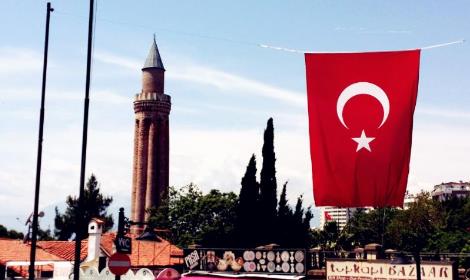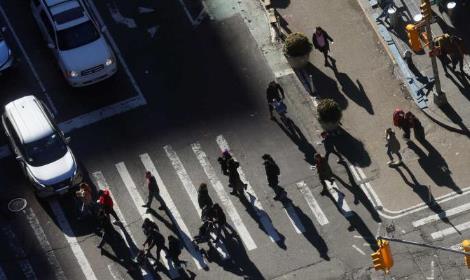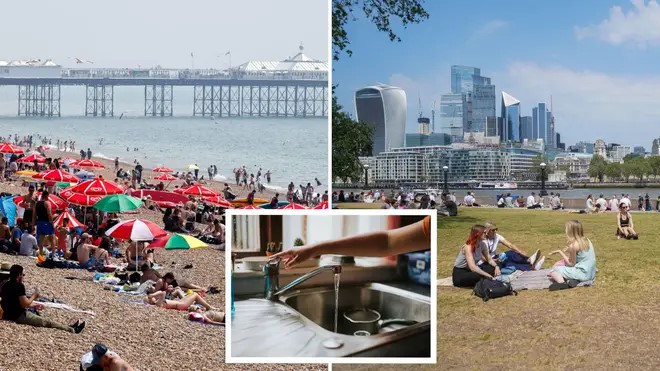英国新冠肺炎死亡人数是欧洲大型经济体中最严重的之一
正文翻译
UK Covid deaths among worst of big European economies
英国新冠肺炎死亡人数是欧洲大型经济体中最严重的之一

(伦敦街头贴满对新冠逝者祝福的爱心墙。)
新闻:
The UK had one of the worst increases in death rates of major European economies during the Covid pandemic, BBC analysis has found.
BBC分析发现,在新冠肺炎大流行期间,英国是欧洲主要经济体中死亡率增幅最大的国家之一。
Death rates in the UK were more than 5% higher on average each year of the pandemic than in the years just before it, largely driven by a huge death toll in the first year.
英国每年的死亡率比前几年平均水平高出5%以上,主要是由于(疫情)第一年的巨大死亡人数造成的。
That was above the increase seen in France, Spain or Germany, but below Italy and significantly lower than the US.
这一增幅高于法国、西班牙和德国,但低于意大利,也远低于美国。
Comparing death rates across countries
比较各国的死亡率
Back in April and May 2020, the UK was seeing one of the worst waves of Covid deaths in the world.
早在2020年4月和5月,英国就经历了世界上最严重的新冠肺炎死亡浪潮之一。
But Prof Sir Chris Whitty, England's chief medical officer, warned against international comparisons of Covid deaths too early in the pandemic.
但英格兰首席医疗官克里斯·惠蒂教授(爵士)当时警告,反对在大流行期间过早地比较各国的死亡人数。
Instead, he recommended looking at deaths for any reason, since they do not depend on what a country calls a Covid death.
相反,他建议关注任何原因的死亡人数,因为它们并不取决于一个国家所谓的“新冠死亡”人数。
And he said analyses should take account of the age profile of each country, which can explain a lot of differences in death rates.
他说,分析应该考虑到每个国家的年龄特征,这可以解释死亡率的很多差异。
We have built a database of those figures, collecting data for the last eight years from a range of European countries, as well as the US and New Zealand.
我们为这些数据建立了一个数据库,收集了过去八年来自一系列欧洲国家、美国和新西兰的数据。
Now the UK's long-awaited Covid inquiry is under way and Sir Chris is about to give evidence for the first time.
现在,英国期待已久的新冠调查正在进行中,克里斯爵士将首次提供证据。
And as the World Health Organization has declared an end to the global health emergency, we have looked back at three years of pandemic deaths, starting in March 2020.
随着世卫组织宣布全球卫生紧急情况结束,我们回顾了从2020年3月开始的三年大流行死亡人数。
We compared countries by measuring how much their death rates rose from those seen in the five years before the pandemic.
我们通过衡量各国的死亡率比大流行前五年的死亡率上升了多少来对各国进行比较。
Over the three years to February 2023, the UK's death rates went up by more than 5%, which is more than France, Germany and Spain (all up between 3% and 4.5%), but by less than Italy's (up more than 6%).
在截至2023年2月的三年里,英国的死亡率上升了5%以上,高于法国、德国和西班牙(涨幅均在3%至4.5%之间),但低于意大利(涨幅超过6%)。
The US and Eastern European countries like Poland were even harder hit, with death rates more than 10% above their pre-pandemic levels over the three years to February 2023.
美国和波兰等东欧国家受到的打击更大,在截至2023年2月的三年中,死亡率比大流行前的水平高出10%以上。
In contrast, death rates fell in countries like Sweden and Norway and also New Zealand, who contained the virus successfully before its vaccination programme took off.
相比之下,在瑞典、挪威和新西兰等国,死亡率下降了,这些国家在疫苗接种计划启动之前成功地控制了病毒蔓延。
The year-by-year figures tell different stories for each country.
每个国家每年的数据都不尽相同。
For the UK, they point to early losses followed by significant success in 2022.
就英国而言,他们指出了英国在疫情早期遭遇了失败,随后在2022年取得了重大成功。
How do the UK's deaths compare each year?
英国如何对比每年的死亡人数?
The UK was one of the worst-hit countries in the first year of the pandemic, with death rates running 15% above those before it started.
英国是疫情第一年受影响最严重的国家之一,死亡率比疫情开始前高出15%。
The combination of a terrible first wave and the rapid spread of the alpha (or Kent) variant just as the vaccine rollout was getting going contributed to a huge death toll.
可怕的第一波疫情和在疫苗要推出的时候快速传播的阿尔法(或肯特)变种的组合传播,导致了巨大的死亡人数。
Many eastern European countries like Poland avoided the spring 2020 wave but overtook the UK in numbers of deaths in the winter of 2020-21.
波兰等许多东欧国家避免了2020年春季的死亡浪潮,但在2020-21年冬季的死亡人数超过了英国。
The US continued to have steadily increasing death rates during the summer of 2020 and by the end of the year, it passed the UK's total.
2020年夏季,美国的死亡率继续稳步上升,到年底,美国的死亡率超过了英国。
Death rates fell in many European nations in the second year of the pandemic as vaccine programmes got under way.
在大流行的第二年,随着疫苗项目的开展,许多欧洲国家的死亡率下降了。
The UK's vaccine rollout is regarded as a "global exemplar", says Prof Devi Sridhar of University of Edinburgh.
爱丁堡大学的德维·斯里达尔教授表示,英国的疫苗推广被视为“全球典范”。
That is not just number of doses, it was also getting them to the people most at risk.
这不仅仅在疫苗的数量方面,也在将它们送到最危险的人手中方面。
And the UK looked better than any major European economy bar Spain in that second year - with death rates below historical averages.
第二年,英国的死亡率低于历史平均水平,比除西班牙以外的任何一个主要欧洲经济体都要好。
In the third year, death rates rose in many countries as they opened up again.
第三年,许多国家重新开放后,死亡率上升。
Some of the largest rebounds we found were in countries like Germany, New Zealand and Norway, who had fared better in the first two years of the pandemic (and well overall).
我们发现,一些最大的反弹发生在德国、新西兰和挪威等国家,这些国家在大流行的头两年表现较好(总体上也不错)。
Norway had far fewer deaths than Sweden in the first year of the pandemic but over the three years the two countries look more similar.
在大流行的第一年,挪威的死亡人数远远少于瑞典,但在三年跨度内,这两个国家看起来更接近差不多。
It is hard to read straight across from Scandinavian countries to the UK, cautions Prof Sridhar, arguing "we'd never look like either Sweden or Norway", and describing them as "healthier, wealthier and more equal" countries that are very different to the UK.
斯里达尔教授警告说,很难从斯堪的纳维亚国家直接解读到英国,他认为“我们永远不会像瑞典或挪威那样”,并将它们描述为与英国截然不同的“更健康、更富裕、更平等”的国家。
Lessons for the UK
英国的教训
It would take many inquiries to tease apart the effect of all the possible reasons behind every nation's pandemic outcomes: preparedness, population health, lockdown timing and severity, social support, vaccine rollout and health care provision and others.
要梳理出每个国家大流行结果背后的所有可能原因的影响,需要进行多次调查:准备状态、人口健康、封锁时间和严重程度、社会支持、疫苗推出和医疗保健提供等等。
But some argue that there are lessons for the UK that need to be learned even before we think about future pandemics.
但一些人认为,在我们考虑应对未来的流行病之前,英国就需要吸取一些教训。
The UK's heavy pandemic death toll "built on a decade of lacklustre performance on life expectancy" says Veena Raleigh, of the King's Fund, a health think tank. She argues that government action to improve population health and turn that around has "never been more urgent".
健康智库“国王基金会”的维娜·罗利表示,英国庞大的流行病死亡人数“建立在十年来预期寿命表现低迷的基础上”。她认为,政府改善人口健康并扭转这一局面的行动“从未像现在这样紧迫”。
英国新冠肺炎死亡人数是欧洲大型经济体中最严重的之一

(伦敦街头贴满对新冠逝者祝福的爱心墙。)
新闻:
The UK had one of the worst increases in death rates of major European economies during the Covid pandemic, BBC analysis has found.
BBC分析发现,在新冠肺炎大流行期间,英国是欧洲主要经济体中死亡率增幅最大的国家之一。
Death rates in the UK were more than 5% higher on average each year of the pandemic than in the years just before it, largely driven by a huge death toll in the first year.
英国每年的死亡率比前几年平均水平高出5%以上,主要是由于(疫情)第一年的巨大死亡人数造成的。
That was above the increase seen in France, Spain or Germany, but below Italy and significantly lower than the US.
这一增幅高于法国、西班牙和德国,但低于意大利,也远低于美国。
Comparing death rates across countries
比较各国的死亡率
Back in April and May 2020, the UK was seeing one of the worst waves of Covid deaths in the world.
早在2020年4月和5月,英国就经历了世界上最严重的新冠肺炎死亡浪潮之一。
But Prof Sir Chris Whitty, England's chief medical officer, warned against international comparisons of Covid deaths too early in the pandemic.
但英格兰首席医疗官克里斯·惠蒂教授(爵士)当时警告,反对在大流行期间过早地比较各国的死亡人数。
Instead, he recommended looking at deaths for any reason, since they do not depend on what a country calls a Covid death.
相反,他建议关注任何原因的死亡人数,因为它们并不取决于一个国家所谓的“新冠死亡”人数。
And he said analyses should take account of the age profile of each country, which can explain a lot of differences in death rates.
他说,分析应该考虑到每个国家的年龄特征,这可以解释死亡率的很多差异。
We have built a database of those figures, collecting data for the last eight years from a range of European countries, as well as the US and New Zealand.
我们为这些数据建立了一个数据库,收集了过去八年来自一系列欧洲国家、美国和新西兰的数据。
Now the UK's long-awaited Covid inquiry is under way and Sir Chris is about to give evidence for the first time.
现在,英国期待已久的新冠调查正在进行中,克里斯爵士将首次提供证据。
And as the World Health Organization has declared an end to the global health emergency, we have looked back at three years of pandemic deaths, starting in March 2020.
随着世卫组织宣布全球卫生紧急情况结束,我们回顾了从2020年3月开始的三年大流行死亡人数。
We compared countries by measuring how much their death rates rose from those seen in the five years before the pandemic.
我们通过衡量各国的死亡率比大流行前五年的死亡率上升了多少来对各国进行比较。
Over the three years to February 2023, the UK's death rates went up by more than 5%, which is more than France, Germany and Spain (all up between 3% and 4.5%), but by less than Italy's (up more than 6%).
在截至2023年2月的三年里,英国的死亡率上升了5%以上,高于法国、德国和西班牙(涨幅均在3%至4.5%之间),但低于意大利(涨幅超过6%)。
The US and Eastern European countries like Poland were even harder hit, with death rates more than 10% above their pre-pandemic levels over the three years to February 2023.
美国和波兰等东欧国家受到的打击更大,在截至2023年2月的三年中,死亡率比大流行前的水平高出10%以上。
In contrast, death rates fell in countries like Sweden and Norway and also New Zealand, who contained the virus successfully before its vaccination programme took off.
相比之下,在瑞典、挪威和新西兰等国,死亡率下降了,这些国家在疫苗接种计划启动之前成功地控制了病毒蔓延。
The year-by-year figures tell different stories for each country.
每个国家每年的数据都不尽相同。
For the UK, they point to early losses followed by significant success in 2022.
就英国而言,他们指出了英国在疫情早期遭遇了失败,随后在2022年取得了重大成功。
How do the UK's deaths compare each year?
英国如何对比每年的死亡人数?
The UK was one of the worst-hit countries in the first year of the pandemic, with death rates running 15% above those before it started.
英国是疫情第一年受影响最严重的国家之一,死亡率比疫情开始前高出15%。
The combination of a terrible first wave and the rapid spread of the alpha (or Kent) variant just as the vaccine rollout was getting going contributed to a huge death toll.
可怕的第一波疫情和在疫苗要推出的时候快速传播的阿尔法(或肯特)变种的组合传播,导致了巨大的死亡人数。
Many eastern European countries like Poland avoided the spring 2020 wave but overtook the UK in numbers of deaths in the winter of 2020-21.
波兰等许多东欧国家避免了2020年春季的死亡浪潮,但在2020-21年冬季的死亡人数超过了英国。
The US continued to have steadily increasing death rates during the summer of 2020 and by the end of the year, it passed the UK's total.
2020年夏季,美国的死亡率继续稳步上升,到年底,美国的死亡率超过了英国。
Death rates fell in many European nations in the second year of the pandemic as vaccine programmes got under way.
在大流行的第二年,随着疫苗项目的开展,许多欧洲国家的死亡率下降了。
The UK's vaccine rollout is regarded as a "global exemplar", says Prof Devi Sridhar of University of Edinburgh.
爱丁堡大学的德维·斯里达尔教授表示,英国的疫苗推广被视为“全球典范”。
That is not just number of doses, it was also getting them to the people most at risk.
这不仅仅在疫苗的数量方面,也在将它们送到最危险的人手中方面。
And the UK looked better than any major European economy bar Spain in that second year - with death rates below historical averages.
第二年,英国的死亡率低于历史平均水平,比除西班牙以外的任何一个主要欧洲经济体都要好。
In the third year, death rates rose in many countries as they opened up again.
第三年,许多国家重新开放后,死亡率上升。
Some of the largest rebounds we found were in countries like Germany, New Zealand and Norway, who had fared better in the first two years of the pandemic (and well overall).
我们发现,一些最大的反弹发生在德国、新西兰和挪威等国家,这些国家在大流行的头两年表现较好(总体上也不错)。
Norway had far fewer deaths than Sweden in the first year of the pandemic but over the three years the two countries look more similar.
在大流行的第一年,挪威的死亡人数远远少于瑞典,但在三年跨度内,这两个国家看起来更接近差不多。
It is hard to read straight across from Scandinavian countries to the UK, cautions Prof Sridhar, arguing "we'd never look like either Sweden or Norway", and describing them as "healthier, wealthier and more equal" countries that are very different to the UK.
斯里达尔教授警告说,很难从斯堪的纳维亚国家直接解读到英国,他认为“我们永远不会像瑞典或挪威那样”,并将它们描述为与英国截然不同的“更健康、更富裕、更平等”的国家。
Lessons for the UK
英国的教训
It would take many inquiries to tease apart the effect of all the possible reasons behind every nation's pandemic outcomes: preparedness, population health, lockdown timing and severity, social support, vaccine rollout and health care provision and others.
要梳理出每个国家大流行结果背后的所有可能原因的影响,需要进行多次调查:准备状态、人口健康、封锁时间和严重程度、社会支持、疫苗推出和医疗保健提供等等。
But some argue that there are lessons for the UK that need to be learned even before we think about future pandemics.
但一些人认为,在我们考虑应对未来的流行病之前,英国就需要吸取一些教训。
The UK's heavy pandemic death toll "built on a decade of lacklustre performance on life expectancy" says Veena Raleigh, of the King's Fund, a health think tank. She argues that government action to improve population health and turn that around has "never been more urgent".
健康智库“国王基金会”的维娜·罗利表示,英国庞大的流行病死亡人数“建立在十年来预期寿命表现低迷的基础上”。她认为,政府改善人口健康并扭转这一局面的行动“从未像现在这样紧迫”。
评论翻译
Consistent-Fly-9522
We'll colour me shocked, it's like we had a two week window into the future with what was happening in Spain and Italy and we still sat on our arses and did nothing.
这让我很震惊,就像我们有两周的窗口期可以看到西班牙和意大利发生的事情,但我们仍然干坐在那里什么都不做。
Cynical_Classicist
The PM was even telling people to take it on the chin!
首相甚至还告诉人们要“勇敢面对”!
Charlie_Mouse
Even worse that slow reaction didn’t just happen during the initial outbreak. Boris and his cronies made the same mistake during pretty much every subsequent wave too.
Boris in particular was pigheadedly resistant to lockdowns - that was the source of his infamous “let the bodies pile high” comment. Each time the same pattern - he’d only finally approve health measures after the deaths started to ramp up to the point it was undeniably bad … but with COVID as deaths lag infections by so long that meant it was already too late and we were up shit creek. It also meant that lockdowns (and other measures) had to be far longer than they needed to be to get the numbers back under control.
Boris managed to compound this further by telling everyone there would be absolutely no lockdowns right up to the last moment … meaning that when things became so screamingly urgent even he realised that there was no choice it caught lots of people and organisations on the hop.
The worst one was the botched Christmas lockdown. Those keeping an eye on the numbers could see it was coming. Boris and other Tories spent weeks insisting there would be no Christmas lockdown (and having a great old time attacking the devolved governments who were trying to put whatever mitigations they were permitted to in place for being “Scrooges”).
更糟糕的是,慢吞吞的应对不仅发生在最初的疫情爆发期间。鲍里斯和他的亲信们几乎在随后的每一波疫情中都犯了同样的错误。
鲍里斯尤其顽固地抵制封锁——这就是他臭名昭著的“让尸体堆成山”言论的来源。每次都是同样的模式——只有在死亡人数开始上升到不可否认的糟糕程度后,他才最终批准卫生措施……但随着疫情的死亡人数上升比感染人数上升要晚很久,这意味着已经太晚了,我们陷入了困境。这也意味着封锁(和其他措施)的时间必须远远超过控制疫情所需的时间。
鲍里斯还设法使情况进一步复杂化,他告诉大家,直到最后一刻之前,都绝对不会有封锁……这意味着,当事情变得如此紧急,就连他也意识到别无选择时(才会同意封锁),这让很多人和组织措手不及。
最糟糕的是圣诞节封锁搞砸了。那些密切关注数字的人可以看到悲剧即将到来。鲍里斯和其他保守党花了数周时间坚称不会在圣诞节实行封锁(并痛斥那些试图实施任何缓和措施的地方政府是“吝啬鬼”)。
When they finally admitted one was necessary they called it so late in the day that most people already had Christmas plans, presents waiting, food for Christmas dinner bought (or in the case of those planning to visit family not bought) … some people were even literally enroute to those Christmas plans when it was announced! The timing could not have been calculated better to cause maximum disappointment and general embuggerance.
Then for an encore Boris decided English schools would start as normal in January - which led to the ridiculous debacle of kids going into school for one day and spreading anything they’d caught on holiday before he finally acknowledged reality. (For comparison in the devolved administrations the decision was made literally weeks beforehand not to go back to go back to in-person teaching)
I’ve actually seen people try to argue that the UK’s experience somehow shows that lockdowns and other public health measures “don’t work”. I think it shows that they don’t work as well as they should when it’s too little, too late and run by a bumbling narcissist who delayed making hard decisions because he was obsessed with his personal popularity.
当他们终于承认有必要举行一次封锁时,他们宣布得太晚了,大多数人已经有了圣诞(出行)计划,礼物准备就绪,圣诞晚餐的食物买好了(或者那些没有买的人都有探亲计划)……有些人甚至在宣布封锁时已经在圣诞节(出行)计划的路上了!这个宣布时间安排得再好不过了——能引起最大程度的失望和普遍的不满。
然后,鲍里斯又决定英国学校将在1月份照常开学——这导致了一场可笑的崩溃:在他最终承认现实之前,孩子们只上了一天学就把他们在假期里感染到的东西都传播出去了。(相比之下,在授权的地方政府中,不再回到面对面教学方式的决定实际上是在几周前做出的)
实际上,我看到有人试图辩称,英国的经验在某种程度上表明,封锁和其他公共卫生措施“不起作用”。我认为这表明,当他们做得太少、太迟,而且由一个笨手笨脚的自恋者管理时,这些措施并没有发挥出应有的作用——因为他痴迷于自己的个人声望,而推迟做出艰难的决定。
Marlboro_tr909
I think with hindsight, this is the major thing we got wrong from a pro-Control perspective. Why we didn't shut the airports and ports for anyone except returning resident will always baffle me
我认为事后看来,从支持疫情管控的角度来看,这是我们犯的主要错误。为什么当时我们不关闭机场和港口,只对回国的居民开放?这一直令我困惑
merryman1
That was such a huge sticking point for me as well.
It was literally raised as a point by pro-government people all the time as well. We're doing worse than other countries because we have these major transport hubs in our borders.
Like... OK... So why aren't we implementing anything but extremely lax controls at these points of entry if we know they're a problem? Was never answered with anything but mumbling excuses about how covid is just like a bad flu anyway, or its already here now so we can't stop it 100% so there's no point even trying to implement controls really... It was a bloody farce tbh.
这在我看来也是一个巨大的纠结点。
事实上,这也是亲政府人士一直以来提出的一个观点。说我们比其他国家做得更差,是因为我们的边境有这些主要的交通枢纽。
就像……好吧……既然我们知道这些入境点是个问题,那为什么我们除了极度松懈的控制之外,什么都不做呢?从来没有回答过任何问题,只是咕哝着借口说“疫情就像一场严重的流感”,或者“它已经出现了,所以我们无法100%阻止它”,所以甚至“没有必要尝试实施管控”……这是一场血腥的闹剧。
Marlboro_tr909
But we then followed it up with lockdown that was overly harsh and poorly targeted imo. It’s like we picked the worst of both worlds - minimal point of entry control AND severe lockdown. Total lack of continuity
但在我看来,我们随后采取了过于严厉但针对性不强的封锁措施。就好像我们选择了两个世界中最糟糕的——最松的入境点管控和严厉的封锁。完全缺乏连续性
ILoveCatNipples
I love how Sweden is casually swept under the carpet in the article.
How many people remember the constant articles that Sweden was committing murder due to their 'irresponsible' measures?
Yet here they are at the end of covid with one of the best records as measured in the article.
I wonder if anyone will look to Sweden for potential lessons learned or will it be ignored as an inconvenience to the narrative that lockdowns should have been longer and harder?
我喜欢这篇报道中对瑞典情况的轻描淡写。
有多少人记得当时不断有文章说瑞典因其“不负责任”的管控措施而犯下谋杀罪?
然而,他们在新冠疫情结束时取得了文章中衡量方式的最佳记录之一。
我不知道是否有人会从瑞典身上吸取潜在的教训,还是会被忽视,因为觉得这是对“封锁时间本应该更长、程度应该更高”的说法的矛盾点?
philman132Sussex
Digging into the Sweden statistics they had horrific numbers early on, with some of the worst first wave numbers, but very good numbers for later waves which made their final figures look more reasonable. Sadly this is largely because most susceptible people had already died in the first wave when it swept through pretty much every elderly home in the country.
The lessons from Sweden are largely that keeping it out of elderly homes and vulnerable people is the most important factor to reduce deaths, ordinary people are spreaders but unlikely to die
深入研究瑞典的统计数据,会发现他们早期的数据很可怕,第一波疫情的数据最糟糕,但后来的数据很好,这使得他们的最终数据看起来更合理。可悲的是,这在很大程度上是因为大多数易感人群在第一波疫情席卷全国几乎所有养老院时就已经死光了。
瑞典的教训很大程度上是:让病毒远离老年人和弱势群体是减少死亡的最重要因素,普通人是传播者,但不太可能死亡
ILoveCatNipples
Well, the data I looked at doesn't match your assertion?
Death rates from Euromomo
If Sweden was 'horific', then England, Italy, Belgium, Spain etc must have been apocalyptic by your standards?
好吧,我看的数据与你的说法不符?
Euromomo的死亡率(译注:链接)
如果瑞典的数据“很可怕”,那么按照你的标准,英国、意大利、比利时、西班牙等国家一定都是世界末日水平了?
philman132Sussex
Yes, I said one of the worst not the worst. I work adjacent to the main hospital in Stockholm and know from colleagues that the conditions and events there were definitely horrific during the peak. And those plots seem to back up what I said, Sweden had a bad first wave spike, a noticeable second wave and then fairly flat after that. Those other countries had many more spikes.
Also I do live in Sweden (am a UK living abroad), and much of the news about what happened here is often incorrect. We didn't have a mandated lockdown like many countries, but a large proportion of workplaces switched to WFH anyway, and shops and restaurants implemented restrictions on numbers etc. It's not as if it was the free for all, continue as normal here that international media likes to make out.
是的,我说的是最坏的之一,不是最坏的。我在斯德哥尔摩的主要医院附近工作,从同事那里得知,在高峰期,那里的情况和事件绝对是可怕的。这些情况表似乎支持了我所说的,瑞典有一个糟糕的第一波疫情高峰,一个明显的第二波疫情,然后就相当平稳了。其他国家的疫情峰值要高得多。
我也住在瑞典(我是一个住在国外的英国人),很多关于这里发生的事情的新闻经常是不正确的。我们没有像许多国家那样强制封锁,但很大一部分工作场所还是转向了“在家办公”,商店和餐馆也实施了人数限制等等。这并不是像国际媒体喜欢说的那样——“一切都是自由的”。
Much_Fish_9794
I’ve been working with a Swedish company for around 6 years, and I used to travel every week to Stockholm.
Whilst we were locked up and couldn’t leave the house but for absolute essentials, the people I were working with were going out to restaurants and drinks every day, literally carrying on like nothing was happening.
Whilst I cannot be arsed to look up numbers, consistently they told me, it’s barely an issue here, a lot of us have had it, it’s flu like conditions.
We were frightened to death here, and I didn’t believe them, until me, my partner, siblings, elderly parents, and friends around me caught it over time. And guess what, it was just flu like.
Old people die of flu all the time, sometimes young people too, but we don’t stop the world for it, we must carry on.
Sweden did the right thing, they carried on.
我在一家瑞典公司工作了大约6年,过去我每周都会去斯德哥尔摩。
当我们被锁起来,并且除了购买绝对必需品,不能离开房子的时候,我的同事每天都出去吃饭喝酒,就像什么都没发生过一样。
虽然我没有勇气去查数据,但他们一直告诉我,这几乎不是问题,我们很多人都得过,就像流感一样。
我们在这里被吓死了,我不相信他们,直到我,我的伴侣,兄弟姐妹,年迈的父母和我周围的朋友随着时间的推移感染了它。你猜怎么着,它就只是像流感之类的。
老人们总是死于流感,有时年轻人也死,但我们不能让世界停止,我们必须坚持前进。
瑞典做了正确的事,他们坚持前进。
AltharaD
I was in Portugal for a large part of Covid and I was able to go out to restaurants and go shopping. Life was pretty normal while the U.K. was still cycling through lockdowns.
The difference was, in Portugal, everyone wore their masks.
Restaurants made sure people were seated outside or with plenty of space/dividers between tables.
After vaccinations became commonplace they checked your vaccination status instead of asking for proof of a negative Covid test.
I wasn’t paying attention to the news one weekend, so I found out when they changed the rules to make people wear their masks outdoors because suddenly everyone was wearing a mask outside.
I never caught Covid once while I was there. Caught it the first tube ride back in London where I was sat in a carriage full of maskless people.
People being sensible and listening to government advice and the government not being reprehensible rule flouting shitheads helped enormously.
新冠疫情期间,我大部分时间都在葡萄牙,我可以出去吃饭、购物。当英国还在封锁期间时,那里的生活相当正常。
区别在于,在葡萄牙,每个人都戴着口罩。
餐馆确保人们坐在外面,或者桌子之间有足够的空间/分隔物。
在疫苗接种变得普遍之后,他们会检查你的疫苗接种状况,而不是要求你提供核酸阴性的证明。
某一个周末,我没有注意看新闻,所以我发现他们改变了规则,让人们在户外戴口罩,因为突然之间每个人都在外面戴口罩了。
我在那里的时候从未感染过新冠病毒。第一次感染是在回伦敦后乘地铁的时候,当时我坐在一节车厢里,车厢里全是没戴口罩的人。
(那里的)人们明智地听取政府的建议,政府治理不会被谴责地蔑视,这些都起到了很大的作用。
BaconOnMySausages
People will never accept that they were locked up for 2 years for no reason.
The people that were clamouring for more restrictions are the same people who are now moaning about the devastating impact it has had on our living standards and will continue to have for the next decade plus.
人们永远不会接受他们无缘无故被封锁了两年。
那些曾经大声疾呼要求出台更多限制措施的人,现在也在抱怨封锁对我们的生活水平造成了毁灭性的影响,并将在未来十多年里继续造成这种影响。
WantsToDieBadly
It’s sunk cost fallacy. They can’t accept it was all for nothing. It goes against the propaganda
Remember this was compared to the blitz. They had the “plucky Brit wartime courage “
By saying lockdown didn’t work they have to admit that the economic damage, mental health damage, removal of in person education and complete removal of civil liberties and rights
这是沉没成本谬误。他们不能接受这一切都是徒劳的。这与宣传背道而驰
记住当时这可是和“闪电战”相提并论的。说他们有“勇敢的英国战时勇气”。
说封锁不起作用,他们就必须承认经济损失、精神健康损害、面对面教育的剥夺以及公民自由和权利的完全剥夺
TIC0101
Whatever the comparisons may be, it makes me so angry thinking about the response from Boris to the pandemic. People will forget because 2020-21 is a blur, but there was a long period around October-November where they were refusing to lock down, despite cases mounting. Well, guess what, they waited far too long, and we were all saying it at the time that they should be locking down, but nope. The result? Christmas was cancelled for most people. Oh and my Granded got Covid and died in that December, a month or two before he’d have gotten a vaccine. On his birthday no less. If they had locked down when they should have, cases wouldn’t have exploded as badly, and my Grandad might still be here. But he died alone, without his family, in a care home, on his birthday. I hadn’t seen him in 10 months before he died. Thanks Boris you lying, inept piece of shit.
不管怎么比,想到鲍里斯对疫情的应对,我都感到非常愤怒。人们会忘记,因为2020-21年是一个模糊的概念,但在10月至11月的很长一段时间里,尽管病例不断增加,但他们拒绝封锁。你猜怎么着,他们拖了太久,我们当时都说他们应该封锁,但没有。结果呢?对大多数人来说圣诞节被取消了。哦,我的爷爷得了新冠,在那年12月去世了,在他接种疫苗前一两个月。而且是在他生日那天。如果他们在该封锁的时候封锁了,病例数就不会爆发得这么严重,我爷爷可能还活着。但在他生日那天,他独自一人死在了一家养老院,没有家人陪伴。他死前我有10个月没见过他了。我谢谢你,鲍里斯你这个扯谎的混蛋。
ug61dec
Yup, if we'd locked down sooner each time, we'd have needed to lock down less, fewer people and loved ones would have died, less impact on the economy. And this is what we were saying at the time.
是的,如果我们每次都早点封锁,我们需要封锁的时间就会少一些,死亡的人和亲人就会少一些,对经济的影响也会小一些。这也是我们当时所提议的。
TIC0101
Yep, exactly. Locking down later always meant locking down for longer, and I just do not understand why. It killed people, damaged the economy and ruined the public morale around Christmas and winter.
是的,没错。更晚的封锁总是意味着更长时间的封锁,我只是不明白为什么。它夺去了人们的生命,破坏了经济,还摧毁了公众在圣诞节和冬季的精神士气。
Neo2allthis
Lockdown and free money were brilliant at the time. I just wish that more people understood that afterwards, the result would be massive inflation and the loss of their businesses and homes. Lesson learned, I suppose.
封锁和免费发钱在当时是很棒的。我只是希望更多的人明白,之后的结果将是大规模的通货膨胀,以及他们的企业和房屋的损失。我想这就是从中吸取的教训。
We'll colour me shocked, it's like we had a two week window into the future with what was happening in Spain and Italy and we still sat on our arses and did nothing.
这让我很震惊,就像我们有两周的窗口期可以看到西班牙和意大利发生的事情,但我们仍然干坐在那里什么都不做。
Cynical_Classicist
The PM was even telling people to take it on the chin!
首相甚至还告诉人们要“勇敢面对”!
Charlie_Mouse
Even worse that slow reaction didn’t just happen during the initial outbreak. Boris and his cronies made the same mistake during pretty much every subsequent wave too.
Boris in particular was pigheadedly resistant to lockdowns - that was the source of his infamous “let the bodies pile high” comment. Each time the same pattern - he’d only finally approve health measures after the deaths started to ramp up to the point it was undeniably bad … but with COVID as deaths lag infections by so long that meant it was already too late and we were up shit creek. It also meant that lockdowns (and other measures) had to be far longer than they needed to be to get the numbers back under control.
Boris managed to compound this further by telling everyone there would be absolutely no lockdowns right up to the last moment … meaning that when things became so screamingly urgent even he realised that there was no choice it caught lots of people and organisations on the hop.
The worst one was the botched Christmas lockdown. Those keeping an eye on the numbers could see it was coming. Boris and other Tories spent weeks insisting there would be no Christmas lockdown (and having a great old time attacking the devolved governments who were trying to put whatever mitigations they were permitted to in place for being “Scrooges”).
更糟糕的是,慢吞吞的应对不仅发生在最初的疫情爆发期间。鲍里斯和他的亲信们几乎在随后的每一波疫情中都犯了同样的错误。
鲍里斯尤其顽固地抵制封锁——这就是他臭名昭著的“让尸体堆成山”言论的来源。每次都是同样的模式——只有在死亡人数开始上升到不可否认的糟糕程度后,他才最终批准卫生措施……但随着疫情的死亡人数上升比感染人数上升要晚很久,这意味着已经太晚了,我们陷入了困境。这也意味着封锁(和其他措施)的时间必须远远超过控制疫情所需的时间。
鲍里斯还设法使情况进一步复杂化,他告诉大家,直到最后一刻之前,都绝对不会有封锁……这意味着,当事情变得如此紧急,就连他也意识到别无选择时(才会同意封锁),这让很多人和组织措手不及。
最糟糕的是圣诞节封锁搞砸了。那些密切关注数字的人可以看到悲剧即将到来。鲍里斯和其他保守党花了数周时间坚称不会在圣诞节实行封锁(并痛斥那些试图实施任何缓和措施的地方政府是“吝啬鬼”)。
When they finally admitted one was necessary they called it so late in the day that most people already had Christmas plans, presents waiting, food for Christmas dinner bought (or in the case of those planning to visit family not bought) … some people were even literally enroute to those Christmas plans when it was announced! The timing could not have been calculated better to cause maximum disappointment and general embuggerance.
Then for an encore Boris decided English schools would start as normal in January - which led to the ridiculous debacle of kids going into school for one day and spreading anything they’d caught on holiday before he finally acknowledged reality. (For comparison in the devolved administrations the decision was made literally weeks beforehand not to go back to go back to in-person teaching)
I’ve actually seen people try to argue that the UK’s experience somehow shows that lockdowns and other public health measures “don’t work”. I think it shows that they don’t work as well as they should when it’s too little, too late and run by a bumbling narcissist who delayed making hard decisions because he was obsessed with his personal popularity.
当他们终于承认有必要举行一次封锁时,他们宣布得太晚了,大多数人已经有了圣诞(出行)计划,礼物准备就绪,圣诞晚餐的食物买好了(或者那些没有买的人都有探亲计划)……有些人甚至在宣布封锁时已经在圣诞节(出行)计划的路上了!这个宣布时间安排得再好不过了——能引起最大程度的失望和普遍的不满。
然后,鲍里斯又决定英国学校将在1月份照常开学——这导致了一场可笑的崩溃:在他最终承认现实之前,孩子们只上了一天学就把他们在假期里感染到的东西都传播出去了。(相比之下,在授权的地方政府中,不再回到面对面教学方式的决定实际上是在几周前做出的)
实际上,我看到有人试图辩称,英国的经验在某种程度上表明,封锁和其他公共卫生措施“不起作用”。我认为这表明,当他们做得太少、太迟,而且由一个笨手笨脚的自恋者管理时,这些措施并没有发挥出应有的作用——因为他痴迷于自己的个人声望,而推迟做出艰难的决定。
Marlboro_tr909
I think with hindsight, this is the major thing we got wrong from a pro-Control perspective. Why we didn't shut the airports and ports for anyone except returning resident will always baffle me
我认为事后看来,从支持疫情管控的角度来看,这是我们犯的主要错误。为什么当时我们不关闭机场和港口,只对回国的居民开放?这一直令我困惑
merryman1
That was such a huge sticking point for me as well.
It was literally raised as a point by pro-government people all the time as well. We're doing worse than other countries because we have these major transport hubs in our borders.
Like... OK... So why aren't we implementing anything but extremely lax controls at these points of entry if we know they're a problem? Was never answered with anything but mumbling excuses about how covid is just like a bad flu anyway, or its already here now so we can't stop it 100% so there's no point even trying to implement controls really... It was a bloody farce tbh.
这在我看来也是一个巨大的纠结点。
事实上,这也是亲政府人士一直以来提出的一个观点。说我们比其他国家做得更差,是因为我们的边境有这些主要的交通枢纽。
就像……好吧……既然我们知道这些入境点是个问题,那为什么我们除了极度松懈的控制之外,什么都不做呢?从来没有回答过任何问题,只是咕哝着借口说“疫情就像一场严重的流感”,或者“它已经出现了,所以我们无法100%阻止它”,所以甚至“没有必要尝试实施管控”……这是一场血腥的闹剧。
Marlboro_tr909
But we then followed it up with lockdown that was overly harsh and poorly targeted imo. It’s like we picked the worst of both worlds - minimal point of entry control AND severe lockdown. Total lack of continuity
但在我看来,我们随后采取了过于严厉但针对性不强的封锁措施。就好像我们选择了两个世界中最糟糕的——最松的入境点管控和严厉的封锁。完全缺乏连续性
ILoveCatNipples
I love how Sweden is casually swept under the carpet in the article.
How many people remember the constant articles that Sweden was committing murder due to their 'irresponsible' measures?
Yet here they are at the end of covid with one of the best records as measured in the article.
I wonder if anyone will look to Sweden for potential lessons learned or will it be ignored as an inconvenience to the narrative that lockdowns should have been longer and harder?
我喜欢这篇报道中对瑞典情况的轻描淡写。
有多少人记得当时不断有文章说瑞典因其“不负责任”的管控措施而犯下谋杀罪?
然而,他们在新冠疫情结束时取得了文章中衡量方式的最佳记录之一。
我不知道是否有人会从瑞典身上吸取潜在的教训,还是会被忽视,因为觉得这是对“封锁时间本应该更长、程度应该更高”的说法的矛盾点?
philman132Sussex
Digging into the Sweden statistics they had horrific numbers early on, with some of the worst first wave numbers, but very good numbers for later waves which made their final figures look more reasonable. Sadly this is largely because most susceptible people had already died in the first wave when it swept through pretty much every elderly home in the country.
The lessons from Sweden are largely that keeping it out of elderly homes and vulnerable people is the most important factor to reduce deaths, ordinary people are spreaders but unlikely to die
深入研究瑞典的统计数据,会发现他们早期的数据很可怕,第一波疫情的数据最糟糕,但后来的数据很好,这使得他们的最终数据看起来更合理。可悲的是,这在很大程度上是因为大多数易感人群在第一波疫情席卷全国几乎所有养老院时就已经死光了。
瑞典的教训很大程度上是:让病毒远离老年人和弱势群体是减少死亡的最重要因素,普通人是传播者,但不太可能死亡
ILoveCatNipples
Well, the data I looked at doesn't match your assertion?
Death rates from Euromomo
If Sweden was 'horific', then England, Italy, Belgium, Spain etc must have been apocalyptic by your standards?
好吧,我看的数据与你的说法不符?
Euromomo的死亡率(译注:链接)
如果瑞典的数据“很可怕”,那么按照你的标准,英国、意大利、比利时、西班牙等国家一定都是世界末日水平了?
philman132Sussex
Yes, I said one of the worst not the worst. I work adjacent to the main hospital in Stockholm and know from colleagues that the conditions and events there were definitely horrific during the peak. And those plots seem to back up what I said, Sweden had a bad first wave spike, a noticeable second wave and then fairly flat after that. Those other countries had many more spikes.
Also I do live in Sweden (am a UK living abroad), and much of the news about what happened here is often incorrect. We didn't have a mandated lockdown like many countries, but a large proportion of workplaces switched to WFH anyway, and shops and restaurants implemented restrictions on numbers etc. It's not as if it was the free for all, continue as normal here that international media likes to make out.
是的,我说的是最坏的之一,不是最坏的。我在斯德哥尔摩的主要医院附近工作,从同事那里得知,在高峰期,那里的情况和事件绝对是可怕的。这些情况表似乎支持了我所说的,瑞典有一个糟糕的第一波疫情高峰,一个明显的第二波疫情,然后就相当平稳了。其他国家的疫情峰值要高得多。
我也住在瑞典(我是一个住在国外的英国人),很多关于这里发生的事情的新闻经常是不正确的。我们没有像许多国家那样强制封锁,但很大一部分工作场所还是转向了“在家办公”,商店和餐馆也实施了人数限制等等。这并不是像国际媒体喜欢说的那样——“一切都是自由的”。
Much_Fish_9794
I’ve been working with a Swedish company for around 6 years, and I used to travel every week to Stockholm.
Whilst we were locked up and couldn’t leave the house but for absolute essentials, the people I were working with were going out to restaurants and drinks every day, literally carrying on like nothing was happening.
Whilst I cannot be arsed to look up numbers, consistently they told me, it’s barely an issue here, a lot of us have had it, it’s flu like conditions.
We were frightened to death here, and I didn’t believe them, until me, my partner, siblings, elderly parents, and friends around me caught it over time. And guess what, it was just flu like.
Old people die of flu all the time, sometimes young people too, but we don’t stop the world for it, we must carry on.
Sweden did the right thing, they carried on.
我在一家瑞典公司工作了大约6年,过去我每周都会去斯德哥尔摩。
当我们被锁起来,并且除了购买绝对必需品,不能离开房子的时候,我的同事每天都出去吃饭喝酒,就像什么都没发生过一样。
虽然我没有勇气去查数据,但他们一直告诉我,这几乎不是问题,我们很多人都得过,就像流感一样。
我们在这里被吓死了,我不相信他们,直到我,我的伴侣,兄弟姐妹,年迈的父母和我周围的朋友随着时间的推移感染了它。你猜怎么着,它就只是像流感之类的。
老人们总是死于流感,有时年轻人也死,但我们不能让世界停止,我们必须坚持前进。
瑞典做了正确的事,他们坚持前进。
AltharaD
I was in Portugal for a large part of Covid and I was able to go out to restaurants and go shopping. Life was pretty normal while the U.K. was still cycling through lockdowns.
The difference was, in Portugal, everyone wore their masks.
Restaurants made sure people were seated outside or with plenty of space/dividers between tables.
After vaccinations became commonplace they checked your vaccination status instead of asking for proof of a negative Covid test.
I wasn’t paying attention to the news one weekend, so I found out when they changed the rules to make people wear their masks outdoors because suddenly everyone was wearing a mask outside.
I never caught Covid once while I was there. Caught it the first tube ride back in London where I was sat in a carriage full of maskless people.
People being sensible and listening to government advice and the government not being reprehensible rule flouting shitheads helped enormously.
新冠疫情期间,我大部分时间都在葡萄牙,我可以出去吃饭、购物。当英国还在封锁期间时,那里的生活相当正常。
区别在于,在葡萄牙,每个人都戴着口罩。
餐馆确保人们坐在外面,或者桌子之间有足够的空间/分隔物。
在疫苗接种变得普遍之后,他们会检查你的疫苗接种状况,而不是要求你提供核酸阴性的证明。
某一个周末,我没有注意看新闻,所以我发现他们改变了规则,让人们在户外戴口罩,因为突然之间每个人都在外面戴口罩了。
我在那里的时候从未感染过新冠病毒。第一次感染是在回伦敦后乘地铁的时候,当时我坐在一节车厢里,车厢里全是没戴口罩的人。
(那里的)人们明智地听取政府的建议,政府治理不会被谴责地蔑视,这些都起到了很大的作用。
BaconOnMySausages
People will never accept that they were locked up for 2 years for no reason.
The people that were clamouring for more restrictions are the same people who are now moaning about the devastating impact it has had on our living standards and will continue to have for the next decade plus.
人们永远不会接受他们无缘无故被封锁了两年。
那些曾经大声疾呼要求出台更多限制措施的人,现在也在抱怨封锁对我们的生活水平造成了毁灭性的影响,并将在未来十多年里继续造成这种影响。
WantsToDieBadly
It’s sunk cost fallacy. They can’t accept it was all for nothing. It goes against the propaganda
Remember this was compared to the blitz. They had the “plucky Brit wartime courage “
By saying lockdown didn’t work they have to admit that the economic damage, mental health damage, removal of in person education and complete removal of civil liberties and rights
这是沉没成本谬误。他们不能接受这一切都是徒劳的。这与宣传背道而驰
记住当时这可是和“闪电战”相提并论的。说他们有“勇敢的英国战时勇气”。
说封锁不起作用,他们就必须承认经济损失、精神健康损害、面对面教育的剥夺以及公民自由和权利的完全剥夺
TIC0101
Whatever the comparisons may be, it makes me so angry thinking about the response from Boris to the pandemic. People will forget because 2020-21 is a blur, but there was a long period around October-November where they were refusing to lock down, despite cases mounting. Well, guess what, they waited far too long, and we were all saying it at the time that they should be locking down, but nope. The result? Christmas was cancelled for most people. Oh and my Granded got Covid and died in that December, a month or two before he’d have gotten a vaccine. On his birthday no less. If they had locked down when they should have, cases wouldn’t have exploded as badly, and my Grandad might still be here. But he died alone, without his family, in a care home, on his birthday. I hadn’t seen him in 10 months before he died. Thanks Boris you lying, inept piece of shit.
不管怎么比,想到鲍里斯对疫情的应对,我都感到非常愤怒。人们会忘记,因为2020-21年是一个模糊的概念,但在10月至11月的很长一段时间里,尽管病例不断增加,但他们拒绝封锁。你猜怎么着,他们拖了太久,我们当时都说他们应该封锁,但没有。结果呢?对大多数人来说圣诞节被取消了。哦,我的爷爷得了新冠,在那年12月去世了,在他接种疫苗前一两个月。而且是在他生日那天。如果他们在该封锁的时候封锁了,病例数就不会爆发得这么严重,我爷爷可能还活着。但在他生日那天,他独自一人死在了一家养老院,没有家人陪伴。他死前我有10个月没见过他了。我谢谢你,鲍里斯你这个扯谎的混蛋。
ug61dec
Yup, if we'd locked down sooner each time, we'd have needed to lock down less, fewer people and loved ones would have died, less impact on the economy. And this is what we were saying at the time.
是的,如果我们每次都早点封锁,我们需要封锁的时间就会少一些,死亡的人和亲人就会少一些,对经济的影响也会小一些。这也是我们当时所提议的。
TIC0101
Yep, exactly. Locking down later always meant locking down for longer, and I just do not understand why. It killed people, damaged the economy and ruined the public morale around Christmas and winter.
是的,没错。更晚的封锁总是意味着更长时间的封锁,我只是不明白为什么。它夺去了人们的生命,破坏了经济,还摧毁了公众在圣诞节和冬季的精神士气。
Neo2allthis
Lockdown and free money were brilliant at the time. I just wish that more people understood that afterwards, the result would be massive inflation and the loss of their businesses and homes. Lesson learned, I suppose.
封锁和免费发钱在当时是很棒的。我只是希望更多的人明白,之后的结果将是大规模的通货膨胀,以及他们的企业和房屋的损失。我想这就是从中吸取的教训。











